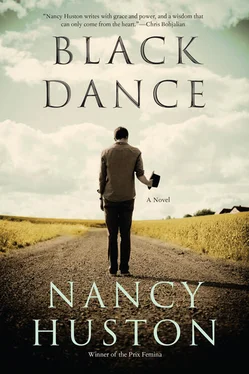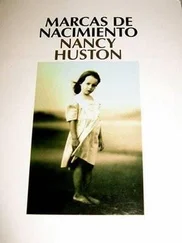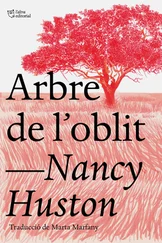The boy balks, in shock. The gray-bearded stranger turns to him and at last we see his face. It may take us a moment to recognize Neil.
“Come on,” he says. “We’ll miss the train.”
“I don’t want to go.”
“What?”
“I don’t want to go.”
“They beat the bejesus out of you and you want to stay with them?”
“I don’t want to go.”
“I didn’t ask you if you wanted to go. I’m your grandpa and I’m taking you out of that Protestant hellhole.”
“You’re not my grandpa.”
“So I am, bless you. Look.” He draws an Irish passport from his breast pocket. “Know how to read? Neil Noirlac. You see, it’s written there. And what’s your name?”
“. .”
“What’s your name, young’un?”
“Milo.”
“Milo what?”
The boy can’t help muttering Noirlac under his breath.
“Right. And where would you have gotten a name like Noirlac?”
“I don’t want to go.”
“Do you know its meaning?”
“I don’t want to go.”
“ Black lake , it means. Did you know your name was black lake , my boy? Do you speak French?”
“I don’t want to go.”
“Come on, now, Milo, or we’ll be missing our train! Way they’ve been treating you, those Protestants are lucky I came without my gun.”
“You got a gun?”
“Naturally, for hunting rabbit and lynx and moose.”
“Will you teach me how to hunt?”
Neil gathers the child in his arms and pretends for a moment that he is strong enough to carry him. He isn’t, though, and, sensing this, Milo gives in.
“I’ll come wit you,” he says, “if you teach me to hunt.”
“You’ve got a deal.”
CUT to the two of them in a train, hurtling northeastward through the province of Quebec. Around them, other passengers are chattering in French. Neil takes out a paper bag and hands a sandwich to Milo, who accepts and devours it without a word, staring out the window at flash-by forest as he chews. Never before has he set foot outside of Montreal.
CUT to a Dubé family meal, the noonday meal they call dinner, in the kitchen of a large farmhouse in Mauricie. Seated on benches on either side of a long maple wood table are Neil’s oldest daughter, a brittly pretty woman named Marie-Thérèse; her husband, Régis Dubé, his cheeks mottled with smallpox scars; and their two strapping teenagers, François-Joseph and Jean-Joseph, all slurping soup and shouting in French at the same time.
Milo is lost. Even were he able to revive the dormant rudiments of French he once possessed, this clipped, slanted, rural version of the tongue would be opaque to him. Occasionally Neil leans down to translate for him, but every time she catches him at it Marie-Thérèse slams her hand on the table.
“Papa! Stop that at once! This is a French-speaking house, he might as well get used to it from the start. I don’t want you running off at the mouth again with your bullshit bilingual notions, do you hear me?”
“How can he be expected to learn?” Neil protests, stroking his beard. “The poor kid doesn’t understand a word we’re saying.”
“He’ll learn as he goes along, like everybody else.”
“Gotta be patient,” Régis suggests, his mouth three or four centimeters away from his bowl of soup. (Régis is a cowed man who seems perpetually to be ducking, even when not bent over to eat.) “Rome wasn’t built in a day,” he adds, so softly as to be inaudible to all but us.
“So where did this Anglo cousin come from?” queries François-Joseph.
“Yeah, Grandad, where’d you dig him up? ‘S not every day you get to meet a cousin who’s already eight years old!”
“He’s Declan’s boy. .”
“Who else?” grumbles Marie-Thérèse.
“But where’s he kept him all these years? We never saw Uncle Declan with a kid. .”
“I had no idea, either,” says Neil. “Declan came over last week to try to wangle some money out of me. .”
“Nothin’ new about that,” observes Marie-Thérèse.
“Just as you say! I told him he’d exhausted my patience, to say nothing of his credit. . So to force me to give in, he wound up telling me the fifty bucks weren’t for him. Claimed he needed the money for his son’s pension. .”
“Doesn’t it just break your heart?” says Marie-Thérèse, shaking her head.
“I didn’t believe him myself. Come on, I told him, you can’t pull the wool over my eyes with tall tales like that! Where is this so-called son of yours?”
“A miracle he could even remember, after so many whiskys. .”
“Well it turned out to be a miracle indeed! He fished out the child’s birth certificate and a whole slew of official papers. . Believe it or not, Milo had been in five different foster families and Declan had never lost track of him. .”
“Good heavens!”
“You were in five different families?”
Milo shrugs, gaze trained on his plate. He can tell the conversation revolves around him, but the gist of it escapes him.
“Why’d they move him around so much?”
“Beats me. But the idea that a grandson of mine had been living in Montreal all this time without my knowing about it. . well, I just couldn’t stand it. I had to go get him.”
“I understand,” Régis mutters. “You did the right thing.”
“Just makes one more mouth for us to feed!” Marie-Thérèse sighs.
“Oh, one mouth more or less,” says Neil.
“Easy to say, for people who have their noses in books all day long,” says Marie-Thérèse. “The rest of us work hard to make ends meet!”
“Come on, now, Marie-Thérèse!” says Neil. “I couldn’t leave him in a Protestant household!”
This is his last card, but it’s a joker and he knows it. Of all the tales of his youth in Ireland with which Neil had regaled the family when Marie-Thérèse was little, the one about the stolen children had made the deepest impression on her. During the endless merciless strike that had paralyzed and famished the entire city of Dublin in 1913, British soldiers had gone stomping into strikers’ homes, kidnapped their children and shipped them off to Great Britain to be taken in by Protestant families. And what honest Catholic worker could bear the prospect of finding himself with a stubborn, glitter-eyed little Protestant at his own kitchen table? They’d returned to the factories. .
After dinner, Milo’s cousins take him on a guided tour of the farm. Close-up on their great rubber boots squelching in the mud as he follows them across the barnyard. In the barn, he recoils at first from the clouds of bottle flies and the pungent smell of manure, but is soon irresistibly drawn to the cows. He feels more empathy with these big kind warm brown tail-swishing dumb beasts than with Jean-Joseph and François-Joseph, fourteen and thirteen respectively, who belch and fart, smoke and swear and swagger to make sure he knows who’s boss.
“Cat got your tongue?” they ask him.
He says not a word in the course of the visit. . CUT.
A SERIES OF ephemeral, floating scenes to sketch out the following year. Milo at school, Milo in the stable. . lingering a moment over Milo at church. We recognize him squeezed into one of the front pews along with his young schoolmates. . His cousin’s classes are farther back; the rows for parents and grandparents start in the middle of the church. We notice that Marie-Thérèse and Régis are among them, but not Neil. .
Dissolve to a winter evening on the farm. Marie-Thérèse has summoned Milo to help her with the job of pickling cucumbers. The kitchen air is opaque with steam.
(The telephone plays a role in this scene, so we’ll have to go back and establish its presence during Milo’s first dinner at the farm: a black Bakelite contraption on the wall above the table. Maybe Marie-Thérèse could mention it, proud of having a telephone at last. Or maybe it could ring during the meal, causing everyone to jump because they’re not used to it yet. . We’ll see. .)
Читать дальше












